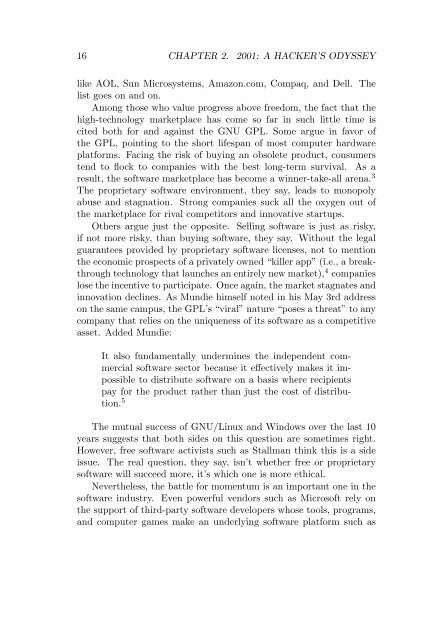You also want an ePaper? Increase the reach of your titles
YUMPU automatically turns print PDFs into web optimized ePapers that Google loves.
16 CHAPTER 2. 2001: A HACKER’S ODYSSEY<br />
like AOL, Sun Microsystems, Amazon.com, Compaq, and Dell. The<br />
list goes on and on.<br />
Among those who value progress above freedom, the fact that the<br />
high-technology marketplace has come so far in such little time is<br />
cited both for and against the GNU GPL. Some argue in favor of<br />
the GPL, pointing to the short lifespan of most computer hardware<br />
platforms. Facing the risk of buying an obsolete product, consumers<br />
tend to flock to companies with the best long-term survival. As a<br />
result, the software marketplace has become a winner-take-all arena. 3<br />
The proprietary software environment, they say, leads to monopoly<br />
abuse and stagnation. Strong companies suck all the oxygen out of<br />
the marketplace for rival competitors and innovative startups.<br />
Others argue just the opposite. Selling software is just as risky,<br />
if not more risky, than buying software, they say. Without the legal<br />
guarantees provided by proprietary software licenses, not to mention<br />
the economic prospects of a privately owned “killer app” (i.e., a breakthrough<br />
technology that launches an entirely new market), 4 companies<br />
lose the incentive to participate. Once again, the market stagnates and<br />
innovation declines. As Mundie himself noted in his May 3rd address<br />
on the same campus, the GPL’s “viral” nature “poses a threat” to any<br />
company that relies on the uniqueness of its software as a competitive<br />
asset. Added Mundie:<br />
It also fundamentally undermines the independent commercial<br />
software sector because it effectively makes it impossible<br />
to distribute software on a basis where recipients<br />
pay for the product rather than just the cost of distribution.<br />
5<br />
The mutual success of GNU/Linux and Windows over the last 10<br />
years suggests that both sides on this question are sometimes right.<br />
However, free software activists such as Stallman think this is a side<br />
issue. The real question, they say, isn’t whether free or proprietary<br />
software will succeed more, it’s which one is more ethical.<br />
Nevertheless, the battle for momentum is an important one in the<br />
software industry. Even powerful vendors such as Microsoft rely on<br />
the support of third-party software developers whose tools, programs,<br />
and computer games make an underlying software platform such as


